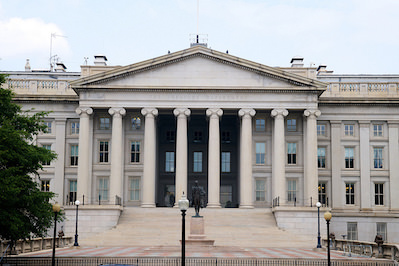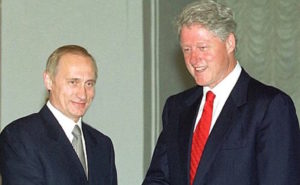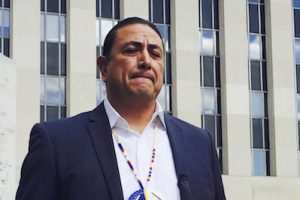New Treasury Rule Could Make It Easier to Hide Money in the U.S., Critics Say
In the wake of the Panama Papers leak, a pending U.S. Treasury rule to discourage the rich from avoiding taxes could in fact enable them to do so, experts say. Release of the new provision is expected soon. The U.S. Treasury Building. (Michael Pick / CC-BY-2.0)
The U.S. Treasury Building. (Michael Pick / CC-BY-2.0)
Experts say a new U.S. Treasury rule written after the release of the Panama Papers to discourage the rich from avoiding taxes could in fact enable them.
The Guardian reported Friday:
Wednesday, the Treasury let it be known it would soon release a rule that would require banks to obtain the names of people at the helm of shell companies seeking to open accounts with them.
The problem? Experts say it’s another one of those “poorly designed” laws that Obama spoke of. And this time it’s being implemented by the Obama administration itself. …
The rule, which is years in the making, would require companies to disclose c-suite officers such as CEOs, chief financial officers and presidents. (Such officers have in the past been provided by firms such as Mossack Fonseca.) The rule would also require companies to disclose shareholders who have 25% or more equity interest in the company, which critics say is too high a threshold.
“Specifying a disclosure threshold is generally an ineffective approach, since it simply invites wrongdoers to arrange their affairs to come in below the specific threshold,” former Michigan senator Carl Levin, at the time chairman of the Senate’s permanent subcommittee on investigations, wrote in a letter to the Treasury in December 2014. He recommended that if the Treasury were set on having a threshold, it ought to consider one closer to 10% than 25%.
“Wrongdoers can simply issue more shares of stock or identify more trust beneficiaries, using nominees, to avoid triggering financial institution oversight. Under the proposed rule as currently drafted, a criminal would have to find only five people to agree to serve as ‘equity’ owners of the relevant legal entity in order to avoid having the names of any beneficial owners included in financial institutions records.”
If the rule is implemented as proposed, it could actually make it easier for shell corporations to hide who the real beneficiary is, according to Elise Bean, former staff director and chief counsel of the permanent subcommittee on investigations of the US Senate’s homeland security and governmental affairs committee. Bean was appointed by Levin in 2004 and left the post in 2014, the same year Levin retired from the Senate.
—Posted by Alexander Reed Kelly.
Your support matters…Independent journalism is under threat and overshadowed by heavily funded mainstream media.
You can help level the playing field. Become a member.
Your tax-deductible contribution keeps us digging beneath the headlines to give you thought-provoking, investigative reporting and analysis that unearths what's really happening- without compromise.
Give today to support our courageous, independent journalists.





You need to be a supporter to comment.
There are currently no responses to this article.
Be the first to respond.